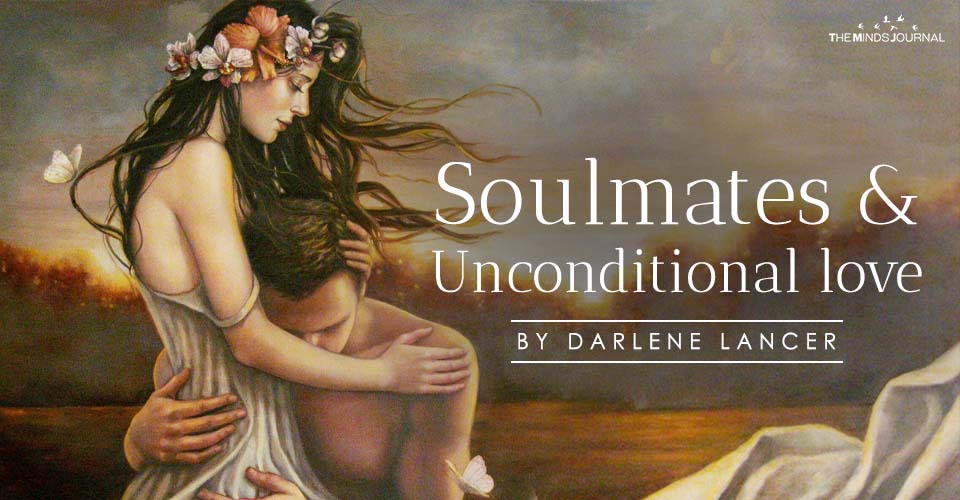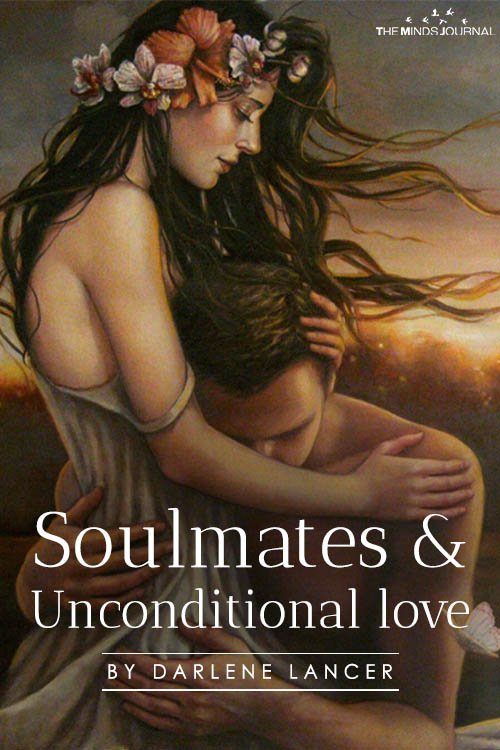Are you searching for a soul mate or unconditional love?
Your quest can set you on an impossible journey to find an ideal partner. The problem is often twofold: No human being, nor any relationship can ever achieve perfection, and often unconditional and conditional love are confused.
Usually, we yearn for unconditional love because we didn’t receive it in childhood and fail to give it to ourselves. Of all relationships, parental love, particularly maternal love, is the most enduring form of unconditional love. (In prior generations, paternal love was thought of as conditional.) But in fact, most parents withdraw their love when over-stressed or when their children misbehave. To a child, even time-outs can feel emotionally abandoning. Right or wrong, most parents at times only love their children conditionally.
Is Unconditional Love Possible?
Unlike romantic love, unconditional love does not seek pleasure or gratification. Unconditional love is more a state of receptivity and allowing, which arises from our own “basic goodness,” says Trungpa Rimpoche. It’s the total acceptance of someone – a powerful energy emanating from the heart.
Love that is unconditional transcends time, place, behavior, and worldly concerns. We don’t decide whom we love, and sometimes don’t know why. The motives and reasons of the heart are unfathomable, writes Carson McCullers:
“The most outlandish people can be the stimulus for love. . . The preacher may love a fallen woman. The beloved may be treacherous, greasy-headed, and given to evil habits. Yes, and the lover may see this as clearly as anyone else – but that does not affect the evolution of his love one whit.” The Ballad of the Sad Café (2005) p. 26.
McCullers explains that most of us prefer to love than be loved:
“ . . . the value and quality of any love is determined solely by the lover himself. It is for this reason that most of us would rather love than be loved. Almost everyone wants to be the lover. And the curt truth is that, in a deep secret way, the state of being beloved is intolerable to many.” Id.
Ideally, the giving and receiving of unconditional love is a unitary experience. Couples experience this most frequently when falling in love. It also happens when someone fearlessly opens up to us in an intimate setting. It’s a being-to-being recognition of that which is unconditional in each of us, our humanity, as if to lovingly say, “Namaste,” meaning: “The God (or divine consciousness) within me salutes the God within you.” When we delight in another’s being-ness, boundaries may dissolve in what feels like spiritual experience. This allows energy to flow into places of resistance that surround our heart and can be deeply healing. It can happen during moments of vulnerability during therapy.
Yet, inevitably, these occurrences don’t last, and we return to our ordinary ego state – our conditioned self. We all have our preferences, idiosyncrasies, and particular tastes and needs, which have been conditioned by our upbringing, religion, society, and experiences. We also have limits about what we will and won’t accept in a relationship. When we love conditionally, it’s because we approve of our partner’s beliefs, needs, desires, and lifestyle. They match up with ours and give us comfort, companionship, and pleasure.
We’re fortunate to meet someone we can love conditionally and, at times, unconditionally. The combination of both forms of love in one relationship makes our attraction intense. It’s the closest we come to finding a soul mate.
Related Video
Confusing Conditional and Unconditional Love
It causes stress and conflict when conditional and unconditional love don’t coexist¸ and frequently people tend to confuse the two. I’ve met spouses who were great companions and best friends, but divorced because their marriage lacked the intimate connection of unconditional love. This can be helped in marriage counseling when individuals learn empathy and the language of intimacy. (See my blog, “Your Intimacy Index.”) But it can lead to frustration and unhappiness if we try to force our heart to love unconditionally when other aspects of the relationship are unacceptable or important needs go unmet.
On the other hand, some couples fight all the time, but stay together because of they share a deep unconditional love for each other. In couples counseling, they can learn to communicate in healthier, non-defensive ways that allow their love to flow. I’ve seen angry couples married over 40 years experience a second honeymoon that’s better than their first!
Other times, the problems in the relationship concern basic values or needs, and one partner or the couple decide to separate despite their love. It’s a mistake to believe that unconditional love means we should accept abuse, infidelity, addiction, or other problems we can’t tolerate. The saying, “Love is not enough” is accurate. The relationship ends, but the individuals often go on loving each other – even despite prior violence – which mystifies onlookers, but it’s okay. Closing our heart in self-protection only hurts us. It limits our joy and aliveness.
Dating
Dating stirs up unrealistic hopes of finding constant unconditional love, because often we allow our conditional needs to take a backseat to the unconditional love that naturally arises early on. But later we wonder if we can live with the other person day in and day out. Our conditional concerns and our struggles to accommodate each other’s needs and personal habits can eclipse the short-lived bliss of unconditional love. When the romance ends, we’re liable to go from one lover to the next looking for our ideal soul mate. The reverse can happen, too. We may find someone who meets all of our conditions, yet doesn’t open our heart.
Sometimes, during the romantic phase of love, people commit to marriage, not knowing their partner well, nor realizing he or she lacks the necessary ingredients that are required to make a marriage work, such as cooperation, self-esteem, and communication and collaborative problem-solving skills.
I don’t believe there is only one soul mate destined for each of us. It might seem so, because the conditional and unconditional rarely overlap. According to research psychologist Robert Firestone, “It is difficult to find individuals who are mature enough emotionally to manifest love on a consistent basis. It is even more problematic to accept love when one does receive it.” (Firestone and Catlett, Fear of Intimacy (1999) p. 311. Emphasis added) Firestone theorizes that couples try to maintain an ersatz version of their initial love through a “fantasy bond,” replaying romantic words and gestures that lack authenticity and vulnerability. Partners feel lonely and disconnected from each other, even if the marriage looks good to others.
Opening the Heart
Unconditional love isn’t a high ideal we need to achieve. Actually, striving after it removes us from the experience. It’s always present as the unconditioned part of us – our “pure, primordial presence,” writes Buddhist psychologist John Welwood. He believes that we can glimpse it through mindfulness meditation. By observing our breath, we become more present and can appreciate our basic goodness. In mediation and in therapy, we find those places we choose to hide from ourselves and others.
In trying to reform ourselves, we necessarily create inner conflict, which alienates us from our true self and self-acceptance. It reflects the belief that we can only love ourselves if we change. That is conditional love, which motivates us to seek unconditional love from others, when we need to give it to ourselves. The more we fight against ourselves, the more we constrict our hearts. Yet, it’s these disowned and unwanted parts of ourselves, which often give us the most problems, that are in the greatest need of our love and attention. Instead of self-judgment, exploration and empathy are necessary. People often enter therapy to change themselves, but hopefully come to accept themselves. Trying to change stems from shame and the premise that we’re inadequate and unlovable.
Relationships
Shame causes problems in relationships, as explained in my book, Conquering Shame. Our self-defeating beliefs and defensive behavior patterns, which were developed in childhood to protect us from shame and emotional abandonment, prevent intimate connection in our adult relationships. Like compliments that we deflect or distrust, we can only receive as much love as we believe we deserve – why McCullers and Firestone agree that receiving love can pose the biggest obstacle to having it. Healing internalized shame is often prerequisite to finding love. Moreover, healthy relationships necessarily demand the openness and honesty of assertive communication, which also requires self-esteem.
Relationships can provide a path to opening the frozen places in our hearts. Love can melt a closed heart. However, maintaining that openness demands courage. The struggle for intimacy challenges us to continually reveal ourselves. Just when we’re tempted to judge, attack, or withdraw, we open to our hurt and that of our partner. In doing so, we discover what we’re hiding. The triggers from our past yield opportunities to heal and embrace more of ourselves.
Healing happens not so much through acceptance by our partner, but in our own self-disclosure. This also happens in a therapeutic relationship. No one can accept all of us as we’d like it. Only we can do that. Our self-compassion enables us to have compassion for others. When we can embrace our own imperfections, we’re more accepting of those in others.
Carson McCullers, The Ballad of the Sad Café and Other Stories (N.Y.: Houghton Mifflin Company, Mariner Books ed. 2005)
Robert W. Firestone and Joyce Catlett, Fear of Intimacy, (Washington, D.C.: American Psychological Association, 1999)
Trungpa, C. Shambhala: The Sacred Path of the Warrior (Boston: Shambhala, 1984)
John Welwood, “On Love Conditional and Unconditional,” The Journal of Transpersonal Psychology, Vol.17, No.1 (1985)
©Darlene Lancer 2018
Become a Contributor at The Minds Journal
We Want To Hear Your Story. Share your work,thoughts and writings and we will make sure, it reaches the world! Submit Now
Written by Darlene Lancer JD, MFT
You may also like
- 6 Things That Happen When You Have To Let Go Of Your Soulmate
- 11 Soulmate Signs He’s Not The One (and how to find the one for real)
- 5 Signs He’s Not Your Soulmate (And You’re Settling For Second Best)
- 4 Simple Ways To Find Your True Soulmate Using The Law Of Attraction









Leave a Reply
You must be logged in to post a comment.